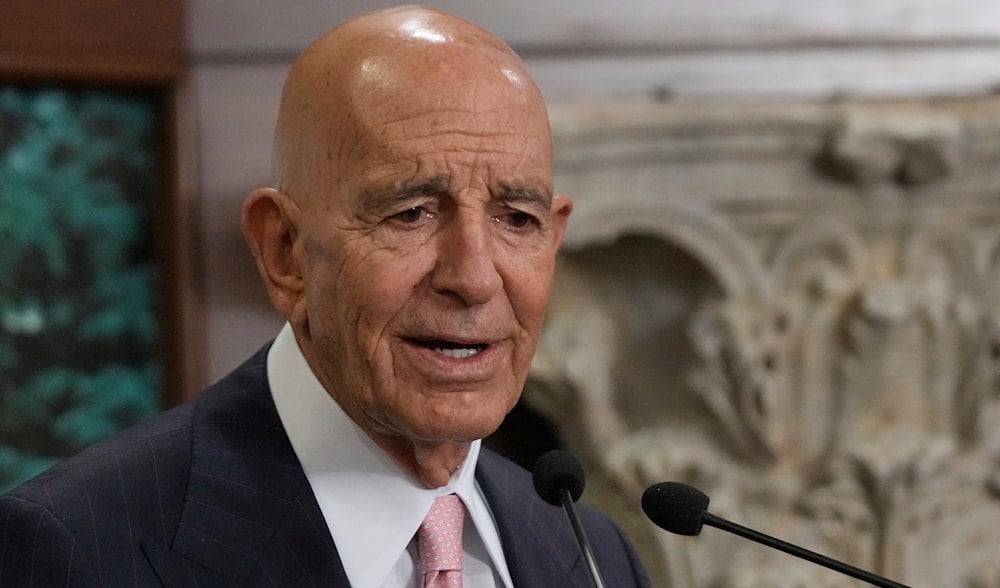Tom Barrack, disrupting decades of diplomatic practice: FT
Fundamentally, Barrack represents a departure from the US' post-WWII role as global security guarantor.
-

US Ambassador to Turkey and Special Envoy to Syria Tom Barrack, speaks during a press conference after his meeting with Lebanese President Joseph Aoun at the presidential palace, in Baabda, east of Beirut, Lebanon, Monday, Aug 18, 2025. (AP Photo/Hussein Malla)
The Financial Times recently published an in-depth profile covering US President Donald Trump's unconventional approach to West Asia diplomacy through his appointment of Tom Barrack, a 78-year-old private equity magnate, as ambassador to Turkey and special envoy to Syria and Lebanon.
The article examines how Barrack, a wealthy confidant with deep personal ties to the region but minimal diplomatic experience, embodies Trump's preference for dealmakers over traditional diplomats. This choice represents a significant departure from decades of established US diplomatic practice in one of the world's most sensitive regions.
Barrack, a Maronite Christian born to Lebanese immigrants in Los Angeles in 1947, first visited Beirut in 1972 as a young lawyer.
After starting his career working for Richard Nixon's personal attorney, Barrack moved to Wall Street and eventually founded his own private equity firm. His relationship with Trump began in 1988 when he brokered the sale of New York's Plaza Hotel to the future president for $408 million, a deal Trump later acknowledged was overpriced, ultimately selling it for $80 million less after bankruptcy.
A controversial track record
The article notes that Barrack's path to his current role hasn't been without controversy. In 2019, a congressional investigation found he had lobbied the Trump administration to share nuclear technology with Saudi Arabia while simultaneously planning to profit from a related Saudi deal. More seriously, he was tried on charges of illegally lobbying for the UAE, though he was acquitted in 2022 after denying any wrongdoing.
Despite these controversies, Barrack has maintained his close relationship with Trump. The Financial Times reports he's one of the few people Trump regularly consults for advice and among the rare individuals who can publicly criticize the president while remaining in his inner circle.
Deals over diplomacy
Five months into his role, the Financial Times argues that Barrack has produced an unusual mix of successes and controversies. He's built strong relationships with Turkish President Recep Tayyip Erdogan and Syria's Ahmad al-Sharaa. Last month, he brokered Erdogan's White House visit, which resulted in multiple energy and defense agreements.
However, his approach has disappointed many. Western diplomats quoted by the newspaper hoped he would be a "super envoy" capable of pushing Hezbollah to disarm and reconciling various regional factions. Instead, Barrack has repeatedly stated his job focuses on "deals" that deliver "prosperity" rather than human rights concerns.
His frequent gaffes haven't helped. For instance, he's called peace in West Asia "an illusion," warned Lebanese journalists not to be "animalistic," and made erroneous claims like asserting there's "no Arabic word for submit." Critics label him patronizing and orientalist, with one diplomat telling the newspaper: "All he seems interested in doing is brokering nebulous deals and pontificating about the 19th century."
READ MORE: Tom Barrack's imperial tantrum in Beirut: When entitlement speaks
An unconventional operational style
Barrack's methods break typical diplomatic protocols. Though technically an ambassador to Turkey, he spends little time in the country, and prefers Istanbul to Ankara when he does visit. One diplomat described him to the Financial Times as "more like a space pilot, up in the stratosphere."
Despite this unorthodox approach, Turkish and US officials say institutional engagement has actually deepened compared to the Biden administration.
His strongest relationship appears to be with Syria's al-Sharaa, who credits Barrack with rallying global support and lifting US sanctions. "You can't create prosperity or hope in the people unless you turn on the fuel," Barrack told the Financial Times, explaining his decision to "give al-Sharaa a chance."
In a revealing interview with Sky News Arabia, US envoy Tom Barrack laid bare the approach at the heart of Trump’s Middle East policy.
— Al Mayadeen English (@MayadeenEnglish) September 23, 2025
While reaffirming unconditional support for "Israel", even boasting of the billions Washington funnels annually, Barrack admitted the US has "no… pic.twitter.com/lxWzRb4ezp
Shifting positions, uncertain outcomes
The Financial Times observes that on-the-ground realities have forced Barrack to backtrack on early positions. He's wavered on confronting Hezbollah, and his stance on Syrian governance has shifted from advocating a centralized state to supporting something closer to decentralization.
His comments on "Israel" have generated particular controversy. Barrack has publicly stated that "Israel" "attacking everybody" is a "problem" and that he doesn't trust the traditional US ally, remarks that have prompted criticism from Washington's pro-"Israel" establishment, with far-right activist Laura Loomer calling for his dismissal.
Fundamentally, Barrack represents a departure from the US' post-WWII role as global security guarantor. "How do you make a better world? You get everybody to stand on their own two feet," he told the Financial Times, insisting the region is no longer America's responsibility.
The central question, as the newspaper frames it, is whether Barrack's Trump connection, dealmaking mentality, and Lebanese heritage can solve intractable regional issues. He acknowledges the role is "a hundred times more work" than being a financier and admits his approach carries nostalgic influences he tries to guard against.

 5 Min Read
5 Min Read










